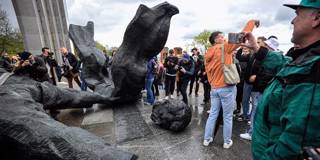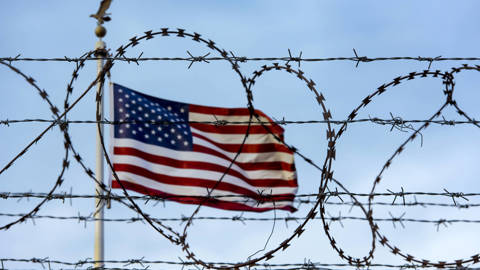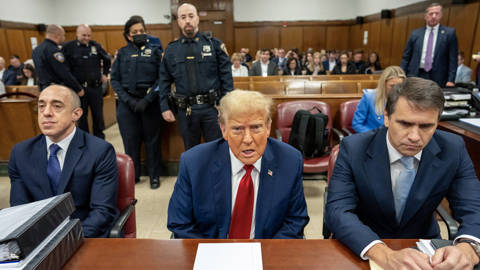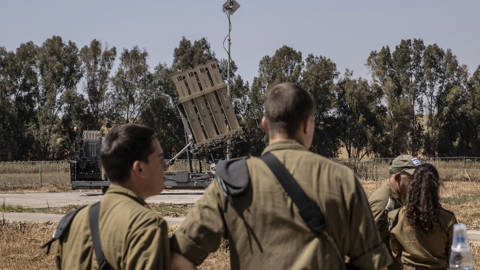A Writer’s War
Not all writers can continue their work – or even want to – when friends and family members are risking their lives against an invading army. Instead, they volunteer at the front, serve as cultural diplomats, and work to remove the occupiers' statues, museums, and street names.
Andriy Lyubka is an award-winning Ukrainian poet, essayist, and translator. The English translation of his debut novel Carbide, which depicts the efforts of Transcarpathian smugglers to dig a tunnel connecting Ukraine with the European Union, was published in 2021 and made the long list for that year’s EBRD Literature Prize. This interview took place during the annual Meridian Czernowitz literary festival (this year simply called “poetry readings”) in Chernivtsi, the first event of its kind to take place since the start of the Russian invasion of Ukraine.
Kate Tsurkan: How have your writing habits changed since the start of the invasion in February? I know that much of your time is now consumed by volunteer efforts, but have you tried to find the time to write, if only for yourself?
Andriy Lyubka: Not really. I must confess that I don’t want to write anything new during this time, be it an article or a novel. After the invasion began, I became very disappointed with what I had been doing beforehand. I did a lot to translate and promote literature from the Balkan countries, especially Serbia, and was constantly being asked by newspapers from throughout the region to give interviews, write essays, and so on. But after the invasion started, a lot of press in Serbia was pro-Russian. The discourse in Bosnia and Herzegovina was mixed, and in Croatia the press tried to play it off as if they shouldn’t take sides. After that I understood that I didn’t want to continue writing and translating. It feels so far removed from the very real issues around us in Ukraine and the people who need help.
Instead, I dived into volunteer work from the very first days of the invasion. I began by helping refugees from the east find places to live here in western Ukraine. It was like CouchSurfing for people in need. Meanwhile, a lot of those trains arriving from the east had to be filled up with aid on their return trips. So I teamed up with other volunteers to get necessary items, such as medicine for frontline hospitals.
A lot of other writers are continuing their work and promoting Ukrainian culture abroad. It is very important, and I’m proud to call them my peers. I know I’ll write again someday, too. But not now. I can’t put myself in the headspace necessary to write. Even if I were to try, my first instinct would be to check the news or make sure my friends serving on the frontlines are still alive.
KT: You’ve attended some literary events abroad since the start of the invasion, and here in Chernivtsi you just presented your new essay collection to a packed audience. Do you struggle with any cognitive dissonance, for lack of a better term, when our new reality overlaps with the former?
AL: I live in Uzhhorod, on the border with Slovakia, so the continuation of everyday routines is pretty normal. It’s hard for me – the differences are more apparent – only when I return from delivering aid to the frontlines. Returning from abroad is also quite difficult. I recently participated in the Edinburgh International Book Festival and it was an entirely different reality. People from around the world have been incredibly supportive of Ukraine during this time, but I am not sure they can fully understand how much our lives have changed. They still live normal lives without air-raid sirens signaling imminent danger. While I was in Edinburgh, I wore a t-shirt emblazoned with some anti-Russian slogan on the front, not my usual attire for literary events. I did it to show our state of mind. We don’t want to wear white dress shirts, because we don’t live that life anymore.
At the same time, I think of the stories I read about the Bosnian War, where Bosnian women put on makeup and their best outfits despite not having enough food or electricity. It’s a question of holding on to one’s dignity. The fact that Meridian Czernowitz happened this year is a small miracle. It conveys the Ukrainian cultural sphere’s profound bravery and, it has to be said, a little bit of craziness. We organized a huge cultural event during a war. But it is very important for us to show that we are also fighting for Ukrainian culture. We fight for the possibility to have such festivals, to speak about what we love and do. And today I even chose to wear that white dress shirt, because I’d like to think that someday we’ll return to having normal lives. It seems like something small, perhaps even insignificant, but, psychologically speaking, it is invaluable. Looking beyond the geopolitical factors, war exists first and foremost on a personal level. Every Ukrainian man, woman, and child has their own perceptions of the war and their own reasons to keep on fighting. It is important to continue to cherish those things that get us through this difficult time.

Subscribe to PS Digital
Access every new PS commentary, our entire On Point suite of subscriber-exclusive content – including Longer Reads, Insider Interviews, Big Picture/Big Question, and Say More – and the full PS archive.
Pushkin Must Go
KT: Following the invasion, the decommunization – or, rather, decolonization – process in Ukraine has accelerated. Just recently, the monument to the Red Army Soldier in the city center of Chernivtsi was removed, something that would have been unthinkable just a few years ago. A statue of Pushkin was removed in Mukachevo, not far from Uzhhorod. It seems to me that a lot of Westerners don’t understand this and, of course, it doesn’t help that Russian authors such as Mikhail Shishkin write in The Atlantic about their hopes that Ukrainian authors will “stand up for” Pushkin and other Russian cultural figures in Ukraine. What do you make of this?
AL: I was one of the people advocating for the change of street names in Uzhhorod back in March. Uzhhorod is a rather small town, and yet we had 56 street names dedicated to Russian scientists, writers, military figures, and so on. It’s crazy. Uzhhorod was never part of the Russian Empire and became part of the Soviet Union only after World War II. That’s a relatively short period of time, all things considered, yet these traces of Russian culture remained. It made little sense to me that after 30 years of Ukrainian Independence and eight years of war with Russia, we still had all these street names and monuments. Unfortunately, a lot of people were against doing anything about it. “What did Pushkin or Turgenev ever do to you?” they asked me. Or they said it was too much of a bureaucratic issue, because a lot of people would have to change their documents. We could think about such things only after the war. But then we discovered the Russian invaders’ war crimes in the Kyiv region and people stopped objecting.
Everything was done very humanely. The Pushkin statue in Mukachevo was relocated to a history museum; we didn’t destroy it. My position regarding the removal of statues and changing of street names has been based on the understanding that we are not against Russian culture. Nor do we approach this as literary critics proclaiming that Pushkin or Turgenev were bad writers. What we are doing now is cleaning up our cities. You must understand that it was very important for the Russians to erect monuments to Pushkin and other cultural figures in cities like Uzhhorod or Mukachevo because it was the western edge of the Soviet Empire. They could boast that Pushkin’s reach extended from Uzhhorod all the way to Vladivostok. But it was not about Pushkin as a poet. I am not sure Putin or his band of killers are all that familiar with Pushkin’s poetry or with any other Russian literary classics, for that matter.
So, again, I must stress that we are not against Russian culture. But it is very difficult to walk on Dostoevsky or Pushkin Street knowing what happened in Bucha. Imagine looking at those street signs while wondering if your friend or family member fighting on the frontlines is still alive. It is, as you mentioned, a form of cognitive dissonance. In this peaceful western part of Ukraine, we don’t have to worry as often about missile strikes, so this is one of the things we can do to help. There are many fronts in this fight for independence, and we want to take part.
KT: Staying on this topic, what’s your opinion of the call put out by many Ukrainians to suspend cooperation with Russian artists during wartime. Do you see a situation in the future where Ukrainian and Russian authors can share the same stage again?
AL: I personally cannot bring myself to do this, not during wartime. But I am sure that in the future, literary festival organizers will continue to try and invite Ukrainian and Russian authors together. I don’t care about the culture wars that so-called good Russians have been waging. At all. I saw the online outrage following Shishkin’s article, but I didn’t read it. It is so far removed from real problems. I don’t have time for that shit. So-called good Russians are trying to create an image for themselves as victims of the war whose suffering is on the same level as ours. At the same time, they have always received a lot of institutional support from the West in the form of scholarships, academic positions, and so on, simply because they are anti-Putin. A lot of time and resources have been spent on accommodating them. I think if literary festivals, residencies, and other institutions want to promote Ukrainian culture and invite Ukrainian authors to participate in their events, they can do it without inviting Russians to sit beside us – especially while Ukrainians are still dying from Russian missile strikes.
After the war, we will all have to do our part to decolonize the discourse surrounding the region. For example, Slavic Studies programs in universities have long been dominated by Russian academic thought. Other Slavic cultures – Czechs, Poles, Slovaks, Ukrainians, and so on – exist for them in the shadow of “great” Russia.
Everything Russian for me these days is unpleasant. I cannot stand listening to Russian-language songs, for example, even those by Ukrainian artists. I know Russian literature very well, but it is hard for me to read something even if it is anti-Russian. I do my best to make sure this language is no longer a part of my life. How is it that I, a Ukrainian from Uzhhorod, grew up fluent in Russian, despite the fact that I have no Russian relatives?
At the same time, it’s impossible to cut ties irrevocably. Let me give you an example. There is currently an ongoing debate about what to do with the Bulgakov Museum in Kyiv. Some people want to get rid of it because they say Bulgakov was a Ukrainophobe and thus deserves no place in our culture, while others advocate a different approach to portraying his ties to Ukraine. There is no common consensus on the issue just yet. I think it is part of the bigger process of decolonization. In order to live normally, we Ukrainians have to find some systemic solution to such questions. It is impossible to deal with museums, street names, and so on in a purely emotional way. And we’ll see the results of our efforts only in the next generation. My hope is that my infant daughter will grow up to be fluent in other languages, not Russian.
The Culture Front
KT: Recently I was thinking about an interview I conducted with Yuri Andrukhovych in which he said that Ukrainian writers – well, writers in general – should not consider themselves diplomats. They are writers first and foremost. Anything else is secondary. Do you believe that is a tenable position in the context of all-out war?
AL: Our first goal as writers should always be to write good texts. That hasn’t changed. Unfortunately, here in Ukraine, writers are also often obliged to take on this strange role of “conscience of the nation.” In our country – especially before the war – people tended not to trust politicians. So writers and other cultural figures were seen as more reliable. When Ukrainian newspapers conduct interviews with writers, for example, it is common for them to ask us questions about politics or the economy. Meanwhile, journalists from abroad ask us questions focused on style and form. To them, we’re just writers.
With the Russian invasion, everything became even more political. Ukrainian writers continue to play this role of cultural diplomats, but not willingly. We would much rather focus on creating art. But I think we do it quite well. Before the invasion, Ukraine was even able to establish some state institutions that support translation and other cultural projects. One immediate result of this was that we had worldwide support following the invasion, because so many people had had the opportunity to discover that Ukrainian culture exists, that it’s quite rich and diverse, and that we’re not bloodthirsty Nazis, as the Russians would like everyone to believe. In that sense cultural diplomacy can be quite useful and effective.
KT: Let’s circle back to your volunteer work. When was the moment that you decided you needed to get involved?
AL: I didn’t want to be a volunteer. I want to live in a country where such things aren’t necessary, but unfortunately that is not our current reality. I’m now a full-time volunteer. It’s quite difficult, and there’s a steep learning curve, but I see positive results every day. I don’t know a lot about cars. It’s not my topic. If you’d told me in March that my life would now revolve around cars, I wouldn’t have believed you. Now I’m a car driver and dealer for the army. Still, the best option for me after the war ends is to return to my regular job and write.
I got involved as a volunteer in a very strange yet natural way. It started during Easter. We have this local tradition in Transcarpathia of putting homemade smoked sausage – kielbasa – in your Easter basket to be blessed by the priest. When my friends and I gathered before the holiday, we decided that our friends who had enlisted needed to receive these sausages so they could still enjoy their Easter, even from the trenches. We bought 100 kilograms of kielbasa, and I called my friend on the frontline, trying to figure out how to transport it to them. He said that their newly-formed unit had just about everything they needed but jeeps. Transport is the lifeline of our military, and cars don’t last very long in war zones. So, we bought a jeep for them. The price was quite high – it was a jeep from Germany that cost €9,400 ($9,700). When I posted my bank account info on Facebook and said that even small contributions would help, my phone lit up. At one point, I had to turn it off, because I was receiving money every second. When I turned my phone on in the morning, I had enough money for two cars. From that point on, I understood that I could use my audience, which I had built for years, to do something good. People wanted to help, and they trusted me to get the job done. This money is coming from middle-class Ukrainians sending small sums of money, but it adds up quickly. I’ve already bought 45 cars in five months, and we’ll keep on going for as long as necessary.
KT: The world has been struck by images from the frontlines, but no one who is not there can truly understand what it’s like. Could you share some lasting impressions from what you saw?
AL: The men and women on the frontline have had to put their lives on hold. It is not an easy existence. With that in mind, it is always quite moving to see how they try to create some kind of comfort for themselves despite the circumstances. As a writer, I am interested in very human things, such as how they make their favorite coffee or how they pass the time in the trenches when not fighting. I also saw a small art exhibition of drawings from soldiers’ children. Those small pieces of paper are not just keepsakes but symbols of what they are fighting for. When we transport parcels from their families and sit and eat with these guys, discussing what’s happening in their hometowns, it’s all quite overwhelming. A grown man could cry.




